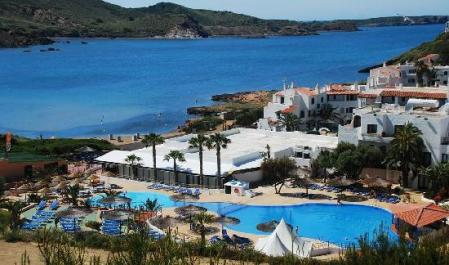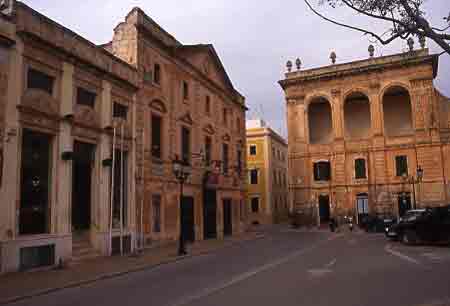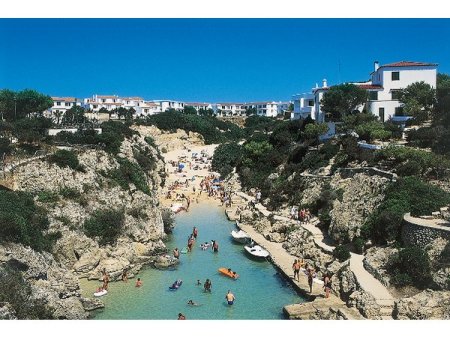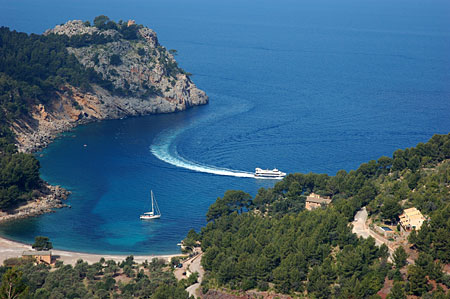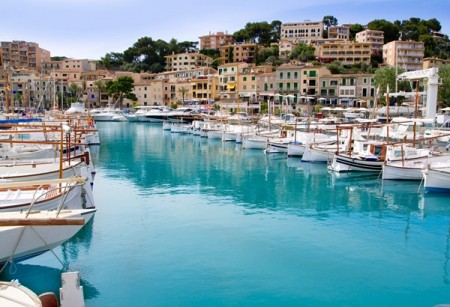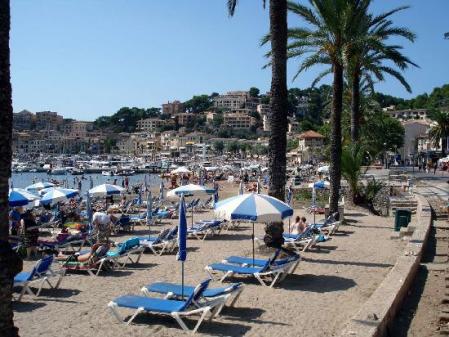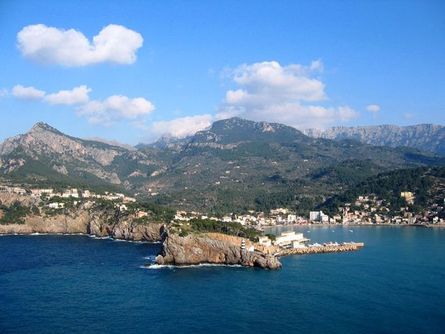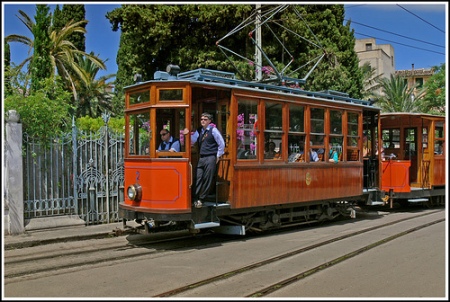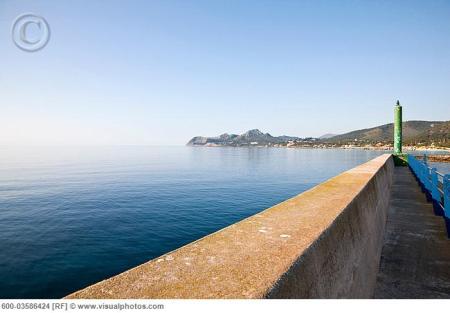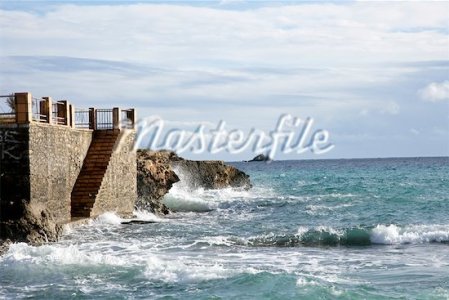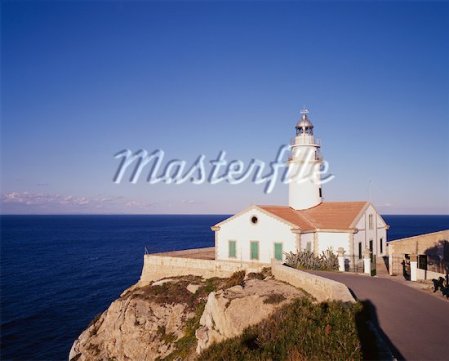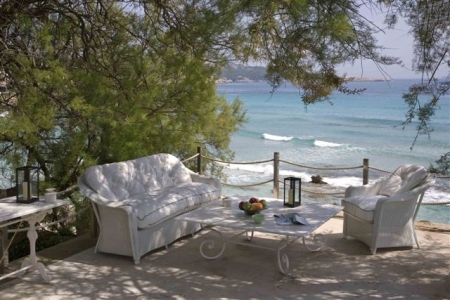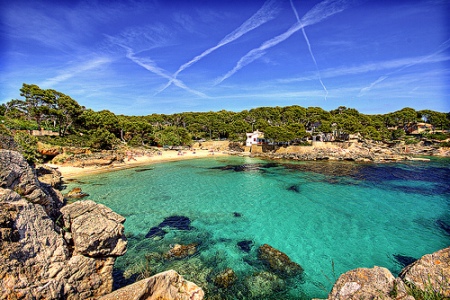Playas de Fornells is considered by many to be one of the most attractive developments in Menorca. The elegant villas of Payas de Fornells,
built in the distinctive local style are served by a small local beach
which is connected by a footpath to the larger beach at Cala Tirant.
It has supermarkets, bars, excellent restaurants and is the perfect place to relax and take it easy.
Hiển thị các bài đăng có nhãn Menorca. Hiển thị tất cả bài đăng
Hiển thị các bài đăng có nhãn Menorca. Hiển thị tất cả bài đăng
Ciutadella Menorca Spain
7/06/2012
Ciutadella, (also known as Ciudadela) is situated on
the W coast, 28 mls W of Mahon and the airport, by good main road. It
is set around long sea inlet, spreading outwards to dry rolling plains
inland.
Flanked by lively urbanised coastal areas to S and relatively deserted coastline to N, it is a small historic town and former capital of the island and is steeped in reminders of the Middle Ages and 400 years of Arab occupation.
Flanked by lively urbanised coastal areas to S and relatively deserted coastline to N, it is a small historic town and former capital of the island and is steeped in reminders of the Middle Ages and 400 years of Arab occupation.
Cala'N Forcat Menorca Spain
7/05/2012
Cala’N Forcat is purpose-built but without real
focus or sign of a design plan. The three-resort conurbation is
clustered around deep rocky coastal inlets with little or no sand.
Puerto De Soller Mallorca Spain
6/07/2012
The municipality of Soller covers an area of around 44 km2 in the
heart of the Sierra de Tramuntana mountain range. The area is dominated
by the impressive “Puig Mayor”, which at 1445m above sea level is the
highest mountain in Mallorca.
The village of Puerto de Soller is the only resort along the west coast of Mallorca, and although being only 35km north west of Palma, transfer time may be a lengthy 2 hours due the the isolation of the area by the Sierra de Tramuntana mountain range. This isolation from the rest of the island, has meant that the area has undergone very little change and tourist development for decades.
The actual resort of Puerto de Soller is an almost perfect horseshoe bay enclosed by two headlands, which is not too dissimilar from many of the resorts on the north coast of Menorca.
At a little over 3km inland from the port is the original old town of Soller. The main road that joins the two is shared with both trams and numerous coaches, as most of the major tour operators to Mallorca incorporate a boat trip around the harbour at Puerto de Soller into their “Scenic West” type day trips. As a result this road can become very busy and congested during the summer months.
This tramway is the only working tram on the island and is known locally at the “Orange Express”. Not for the colour of the carriages, but due to the fact that its route meanders from the old town, through orange groves to terminate at the harbour at Puerto de Soller.
Locality:
Puerto De Soller is halfway along the north west coast (22 mls N of Palma, partly through tunnel. 2½ mls NW of Soller old town. 27 mls N of airport). It is situated in a semicircular bay, enclosed by 2 headlands, each with lighthouse. Hills rise on all sides.
Local excursions consist of half day: Soller and its Saturday market;
picture-postcard villages of Biniaraix and Fornalutx. Full day: Cove of
Sa Calobra by serpentine road or boat; mountain villages of Deya and
Valldemosa; monastery of Lluc; Palma.
The village of Puerto de Soller is the only resort along the west coast of Mallorca, and although being only 35km north west of Palma, transfer time may be a lengthy 2 hours due the the isolation of the area by the Sierra de Tramuntana mountain range. This isolation from the rest of the island, has meant that the area has undergone very little change and tourist development for decades.
The actual resort of Puerto de Soller is an almost perfect horseshoe bay enclosed by two headlands, which is not too dissimilar from many of the resorts on the north coast of Menorca.
At a little over 3km inland from the port is the original old town of Soller. The main road that joins the two is shared with both trams and numerous coaches, as most of the major tour operators to Mallorca incorporate a boat trip around the harbour at Puerto de Soller into their “Scenic West” type day trips. As a result this road can become very busy and congested during the summer months.
This tramway is the only working tram on the island and is known locally at the “Orange Express”. Not for the colour of the carriages, but due to the fact that its route meanders from the old town, through orange groves to terminate at the harbour at Puerto de Soller.
Locality:
Puerto De Soller is halfway along the north west coast (22 mls N of Palma, partly through tunnel. 2½ mls NW of Soller old town. 27 mls N of airport). It is situated in a semicircular bay, enclosed by 2 headlands, each with lighthouse. Hills rise on all sides.
The area is popular with middle-aged couples, those interested in
walking and scenery, and anyone looking for a quiet, low-key holiday.
Beaches are small with limited appeal and there’s little for children to
do, so not really for families or sun worshippers.
There is a small beach to one side of harbour comprises a narrow
300-yd strip of (none too clean) sand, augmented in places with imported
material; gives way to shingle before petering out. Repic Beach, on the
opposite side of the bay, has just ¼ ml of sand and shingle and slopes
at the water’s edge.
Daytime activities consist of boat trips to various coves; numerous
hiking trails in surrounding mountains; water sports including
windsurfing and sailing; pedallo hire; botanical gardens in Soller.
Nightlife provides one or two music bars and a disco, augmented by some music laid on by hotels.
As with most of the smaller resorts on the island, both Soller and Puerto de Soller, affords their visitors a good selection of quality restaurants, offering both local Mallorquin and international cuisine. Also, quite out of step with the rest of the area, there is even one well known fast food outlet. Being a port, Puerto de Soller does have a couple of noteworthy fish restaurants in the town. The first is called “Sa Llotja des Peix”, which overlooks the harbour, and the other “Es Pescador” also offers a good selection of typical Mediterranean dishes.
As with most of the smaller resorts on the island, both Soller and Puerto de Soller, affords their visitors a good selection of quality restaurants, offering both local Mallorquin and international cuisine. Also, quite out of step with the rest of the area, there is even one well known fast food outlet. Being a port, Puerto de Soller does have a couple of noteworthy fish restaurants in the town. The first is called “Sa Llotja des Peix”, which overlooks the harbour, and the other “Es Pescador” also offers a good selection of typical Mediterranean dishes.
Cala Ratjada Mallorca Spain
5/31/2012
Before the onset of tourism in the 1960′s, the original village of
Cala Ratjada was a quiet little fishing port, who’s name literally
translates as “The Bay of Rays”. The original harbour still exists, but
today is more likely to be the home of expensive private cruisers than
the fishing boats of times gone by.
Historically, Cala Ratjada has also played a very important part in the Mallorcan economy. This part of the island is the nearest point to the neighbouring island of Menorca, and on a clear day it is possible to see the former Menorcan capital of Ciutadella from the port area. Cape Balear also run a daily hydrofoil service from Cala Ratjada over to Ciutadella.
Cala Ratjada is a resort that is overwhelmingly popular with German tourists, with a lot of British and some French aswell. Frequented by families and groups of young singles, the resort is one of those rare destinations that seems to suit both equally, with entertainment day and night.
Historically, Cala Ratjada has also played a very important part in the Mallorcan economy. This part of the island is the nearest point to the neighbouring island of Menorca, and on a clear day it is possible to see the former Menorcan capital of Ciutadella from the port area. Cape Balear also run a daily hydrofoil service from Cala Ratjada over to Ciutadella.
Despite being a well established resort, with a selection of over 40
hotels with a reported capacity of almost 12,000 beds to choose from,
until a couple of years ago Cala Ratjada still remained virtually
“undiscovered” by the British tourist. Even today the larger UK Tour
Operators are only just including it in their Summer Sun offerings.
Also, quite rare for Mallorca, Cala Ratjada is very popular with
French visitors, but it is without a doubt, the German tourist who far
outnumber the rest.
Locality:
Cala Ratjada is located in the NE part of the island, 40 mls NE of
the island’s capital, Palma, and its international airport. It is
situated on a small peninsula, bounded by pine forest on 3 sides. Near
the foothills of the San Jaumell and S’Aguila mountains.Cala Ratjada is a resort that is overwhelmingly popular with German tourists, with a lot of British and some French aswell. Frequented by families and groups of young singles, the resort is one of those rare destinations that seems to suit both equally, with entertainment day and night.
The atmosphere changes dramatically in winter, when it becomes popular
with the older generation seeking winter sunshine. The accommodation is
generally modern, 3- and 4-star hotels, around 40 in total. Some 1- and
2-star choices, and a handful of aparthotels. Several varieties of
beaches are present in the area with options of coarse, pale golden
sand, often covered in pine needles. The main town beach, Son Moll, is a
short stretch of sand backed by a busy promenade. It gets very crowded
and noisy, and shelves steeply. Cala Gat, just 50 yds long and 25 yds
wide, is fringed by pine trees and rocks; steps lead down to a concrete
terrace with a small cafe and music. Its clear waters become rocky very
quickly and shelve steeply. Round the peninsula is Cala Agulla, a narrow
½-ml swathe backed by pine woods and dunes; it has 4 small cafes/snack
bars, plus sun loungers and parasols. The beach shelves gently over
large rocky areas.
Shopping in Cala Ratjada provides wall-to-wall tourist shops although it
is more of a day-time diversion rather than a serious shopping
opportunity. There are plenty of outlets selling supplies from food to
suntan lotion. Basketry and palm-weaving are local traditions. There is a
weekly Saturday market at Plaça del Pins. General activities in the
area tend to include mainly beach activities, strolling along the
promenade. Horse riding, Tennis, Golf, Hiking (high hills with views).
The tourist office has a programme of events and activities.
By night there area an overwhelming choice of bars, discos and beer
gardens catering to a large number of groups of drinking singles who
often don’t go home until breakfast time. Some venues are sophisticated,
some charge an entrance fee and almost all have outdoor terraces.
Cocktail bars along the water’s edge. Local dancing. Occasional
classical concerts in the parish church. Popular excursions include a
trip to the Capdepera (medieval castle), Es Claper des Gegants
prehistoric settlement (full day), cave exploring, March Gardens (a
parkland with 60 sculptures) including some by Henry Moore and Auguste
Rodin. Tourist office arranges a programme of activities.
Đăng ký:
Bài đăng (Atom)

